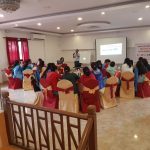

With Halloween just around the corner, it’s a good time to think about how to resurrect those old grant applications that you’ve long since forgotten about.
But what do you do after hearing your application was unsuccessful? As part of the Research and Knowledge Exchange Development Framework, RKEO are holding a session on ‘Confronting your Unsuccessful application’. This one-day event will combine:
- information about how individuals deal with rejection
- advice and guidance on how this can be turned into something positive
- advice on how feedback can be approached
- the opportunity for individuals to work on revising their bids, using the above as a basis for doing so.
The afternoon session will comprise of 1-2-1 sessions with the external facilitator, to get specific advice relating to your application.
 There are 15 spaces available for academic staff whose funding application has been rejected and wish to re-submit to another funder, within the next 12 months.
There are 15 spaces available for academic staff whose funding application has been rejected and wish to re-submit to another funder, within the next 12 months.
Date: Wednesday 15th November 2017
Time: 09:00-13:30 with opportunities for a 1-2-1 appointment in the afternoon session
Venue: Lansdowne Campus
Book your space via the RKE Development Framework page for this event.
For further information, please contact Lisa Gale-Andrews, RKEO Research Facilitator.
 Have you been unsuccessful with a grant application and don’t know what to do next? Don’t give up! Come to our session on ‘Confronting your unsuccessful application’ 15th November 2017
Have you been unsuccessful with a grant application and don’t know what to do next? Don’t give up! Come to our session on ‘Confronting your unsuccessful application’ 15th November 2017










 BU academic publishes in online newspaper in Nepal
BU academic publishes in online newspaper in Nepal Final day of the ESRC Festival of Social Science
Final day of the ESRC Festival of Social Science Using Art to enhance Research
Using Art to enhance Research Register now to attend the 17th Annual Postgraduate Research Conference – Wednesday 3 December 2025
Register now to attend the 17th Annual Postgraduate Research Conference – Wednesday 3 December 2025 ECR Funding Open Call: Research Culture & Community Grant – Application Deadline Friday 12 December
ECR Funding Open Call: Research Culture & Community Grant – Application Deadline Friday 12 December MSCA Postdoctoral Fellowships 2025 Call
MSCA Postdoctoral Fellowships 2025 Call ERC Advanced Grant 2025 Webinar
ERC Advanced Grant 2025 Webinar Horizon Europe Work Programme 2025 Published
Horizon Europe Work Programme 2025 Published Horizon Europe 2025 Work Programme pre-Published
Horizon Europe 2025 Work Programme pre-Published Update on UKRO services
Update on UKRO services European research project exploring use of ‘virtual twins’ to better manage metabolic associated fatty liver disease
European research project exploring use of ‘virtual twins’ to better manage metabolic associated fatty liver disease